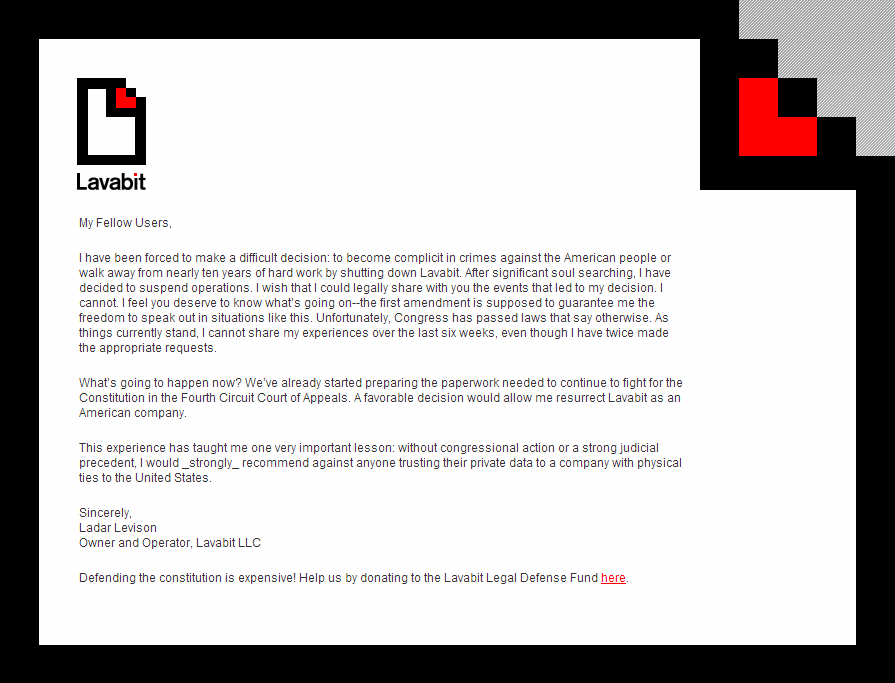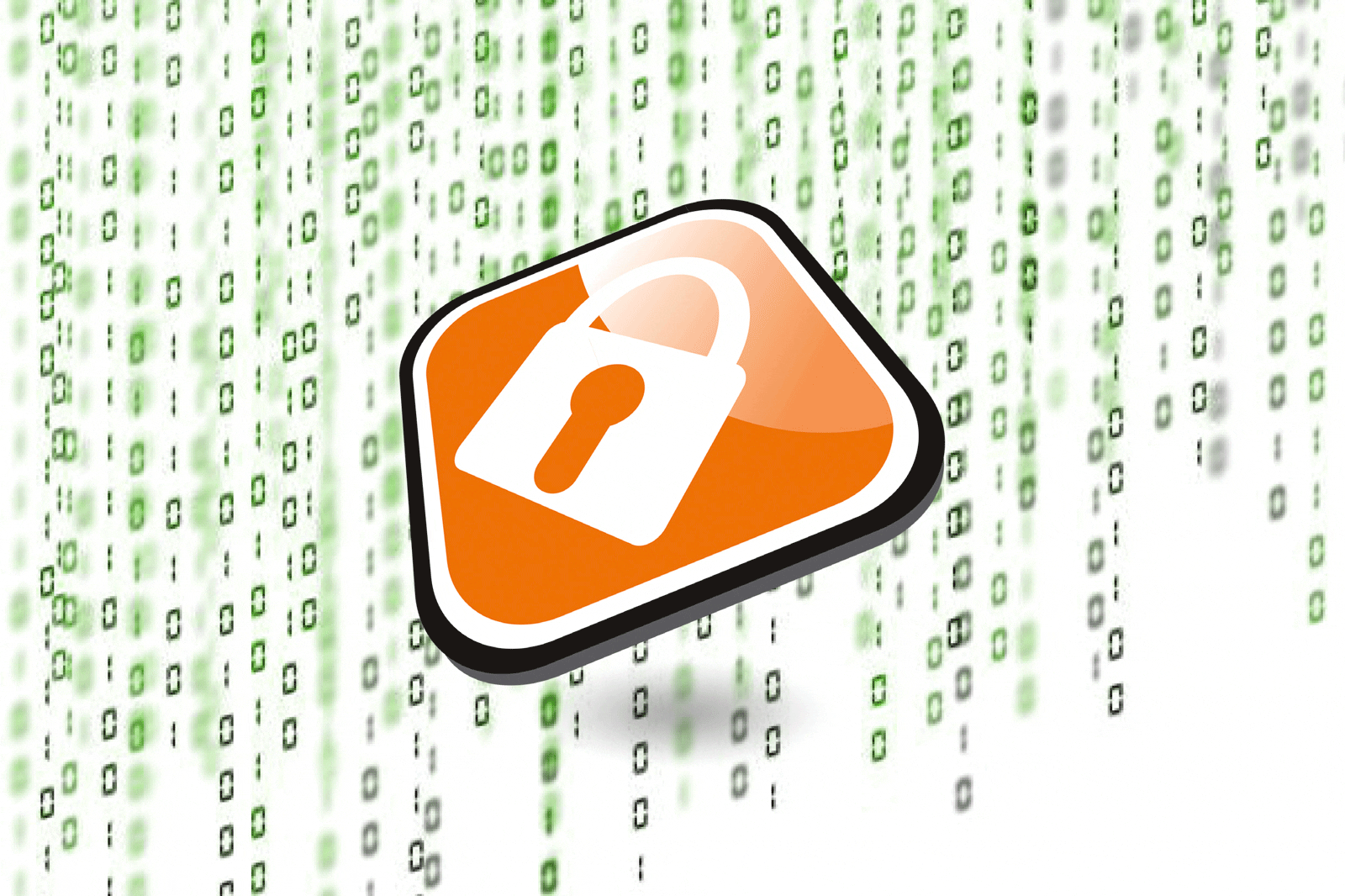
The two companies essentially committed suicide.
The shutdown of two small e-mail providers on Thursday illustrates why it is so hard for Internet companies to challenge secret government surveillance: to protect their customers’ data from federal authorities, the two companies essentially committed suicide.
Lavabit, a Texas-based service that was reportedly used by Edward J. Snowden, the leaker who had worked as a National Security Agency contractor, announced the suspension of its service Thursday afternoon. In a blog post, the company’s owner, Ladar Levison, suggested — though did not say explicitly — that he had received a secret search order, and was choosing to shut the service to avoid being “complicit in crimes against the American people.”
Within hours, a fast-growing Maryland-based start-up called Silent Circle also closed its e-mail service and destroyed its e-mail servers. The company said it saw the writing on the wall — while also making it plain that it had not yet received any court orders soliciting user data.
Mike Janke, the chief executive, said the company’s customers included heads of state, members of royalty and government agencies. The company will continue its encrypted phone and text messaging service.
In effect, both businesses destroyed their assets — in part or in full — to avoid turning over their customers’ data. Such public displays are far more difficult for large companies to make, and help explain why the most public efforts to challenge secret government orders have come from small companies and nonprofits.
“Providers are in a bind,” observed Orin Kerr, a law professor who specializes in surveillance law at George Washington University. “They need to respect the privacy rights of customers in order to keep customers, but they also have an obligation to comply with the law. A small company can say, ‘Rather than comply with the law, we will go under.’ But Verizon is not going to do that.”
He added: “The government usually has an easier time with large companies because they have more of a long-term need to have good relations with the government.”
Large Internet companies have moved more quietly and cautiously, addressing consumers’ concerns about government requests only after information about secret orders was leaked by Mr. Snowden. This week, technology industry executives and lobbyists attended meetings at the White House.
The Latest Bing News on:
Secret government surveillance
- IHC judges’ letter: Justice Minallah says ‘truth kept hidden for 76 years’on May 7, 2024 at 5:17 am
Justice Athar Minallah on Tuesday remarked that the “truth was hidden for 76 years” as the Supreme Court resumed hearing a suo motu case pertaining to allegations regarding interference in judicial ...
- Eye-in-the-Sky: Cape Town’s new crime-fighting secret weaponon May 6, 2024 at 10:58 am
The City of Cape Town demonstrated its powerful new crime-fighting aerial surveillance technology during a staged search, rescue and car chase scenario on Monday, 6 May. On hand to observe was Premier ...
- The Hidden-Pregnancy Experimenton May 4, 2024 at 3:00 am
We are increasingly trading our privacy for a sense of security. Becoming a parent showed me how tempting, and how dangerous, that exchange can be.
- N.S.A. Disclosure of U.S. Identities in Surveillance Reports Nearly Tripled in 2023on April 30, 2024 at 4:09 pm
The sharp increase of so-called unmaskings, to more than 31,300 times, arose from attempts by foreign hackers to infiltrate the computer systems of critical infrastructure.
- Government spy power deal hands hidden hope to Trump allieson April 29, 2024 at 2:00 am
That’s because, in order to push through reauthorization of the surveillance power known as Section 702, which allows the government to collect and search foreign communications without a ...
- Government spy power deal hands hidden hope to Trump allieson April 29, 2024 at 2:00 am
Conservatives who haven’t given up on slashing the scope of the wiretapping authority are already strategizing about how to win the next battle in two years.
- Biden signs bill criticized as “major expansion of warrantless surveillance”on April 22, 2024 at 3:55 am
"Forcing ordinary Americans and small businesses to conduct secret, warrantless spying ... to address the extent to which the government conducts surveillance over its own citizens." ...
- The NSA Wants Carte Blanche for Warrantless Surveillanceon April 17, 2024 at 5:00 pm
The size of a small city, it is the largest, most secret, most powerful ... of the most dramatic and terrifying expansions of government surveillance authority in history,” warned Senator ...
- Secret Rift Over Data Center Fueled Push to Expand Reach of Surveillance Programon April 15, 2024 at 5:00 pm
The surveillance court in 2022 ... “This change can be used to turn innumerable scores of Americans into secret government spies, posing a severe threat to hundreds of thousands of big and ...
- Inside SFU’s Secret Surveillance of Striking Workerson April 7, 2024 at 5:00 pm
But Sahota, whose union also obtained records about the contract through FOI, said the extent and secrecy of SFU’s surveillance ... allowed to pay under a B.C. government mandate.
The Latest Google Headlines on:
Secret government surveillance
[google_news title=”” keyword=”Secret government surveillance” num_posts=”10″ blurb_length=”0″ show_thumb=”left”]
The Latest Bing News on:
Government surveillance
- Va. health officials launch ‘surveillance system’ for kids sickened by cannabison May 8, 2024 at 7:46 am
Virginia officials are instructing health care providers to start keeping track of “adverse events” involving children and teens being exposed to cannabis products.
- Philly narcotics cops secretly used surveillance cameras. Video proved some of their testimony false.on May 8, 2024 at 2:00 am
The police paperwork described a textbook drug bust. Officer Ricardo Rosa, sitting in an unmarked car in West Philadelphia, watched a suspected dealer make a hand-to-hand drug transaction. Then other ...
- Virginia health officials launch ‘surveillance system’ for kids sickened by cannabison May 7, 2024 at 11:01 pm
The tracking system set up by health officials is the latest government effort to mitigate the downsides of cannabis, as policymakers continue to debate what to do about adult use of marijuana and ...
- Government Surveillance Contractor Palantir's AI Tactics Under Microscope By Wall Street Analysts: Must 'Demonstrate' Growth To Justify Valuationon May 7, 2024 at 11:35 am
The analyst said the first-quarter financial report was solid with "healthy revenue upside." "The rebound in Government was a pleasant surprise, although the Commercial beat coming entirely from ...
- Senator eyes links between POGOs, hacking of government websites, surveillanceon May 7, 2024 at 5:07 am
A SENATOR on Tuesday aired serious concern over Philippine Offshore Gaming Operators (POGOs) that may have possible connections to surveillance activities and the hacking of government websites. Sen.
- Chinese-Made Surveillance Cameras Are Spreading Across Eastern Europe, Despite Security Concernson May 6, 2024 at 12:00 am
Despite growing concerns over lax data practices, security vulnerabilities, and ties to the Chinese state, the world’s two largest manufacturers of surveillance cameras are expanding across Central ...
- Security News This Week: A New Surveillance Tool Invades Border Townson May 4, 2024 at 3:30 am
Plus: An assassination plot, an AI security bill, a Project Nimbus revelation, and more of the week’s top security news.
- Government says replacement of Chinese estates surveillance equipment is ‘on track’on May 1, 2024 at 5:17 am
Government organisations are ahead of schedule with the plan to replace all Chinese surveillance equipment at sensitive sites by April of next year, two ministers have told Parliament.
- N.S.A. Disclosure of U.S. Identities in Surveillance Reports Nearly Tripled in 2023on April 30, 2024 at 4:09 pm
The sharp increase of so-called unmaskings, to more than 31,300 times, arose from attempts by foreign hackers to infiltrate the computer systems of critical infrastructure.
- U.K. Government May Still Use Chinese Surveillance Kit Well Into Next Yearon April 30, 2024 at 5:27 am
Only half the U.K. government sites using Chinese surveillance equipment have had that kit removed, 18 months after the government committed to doing so.
The Latest Google Headlines on:
Government surveillance
[google_news title=”” keyword=”government surveillance” num_posts=”10″ blurb_length=”0″ show_thumb=”left”]










